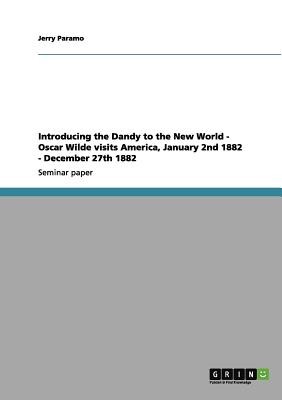
- We will send in 10–14 business days.
- Author: Jerry Paramo
- Publisher: GRIN Verlag
- Year: 2012
- Pages: 60
- ISBN-10: 3656168687
- ISBN-13: 9783656168683
- Format: 14.8 x 21 x 0.4 cm, softcover
- Language: English
- SAVE -10% with code: EXTRA
Introducing the Dandy to the New World - Oscar Wilde visits America, January 2nd 1882 - December 27th 1882 (e-book) (used book) | bookbook.eu
Reviews
Description
Seminar paper from the year 2008 in the subject English Language and Literature Studies - Literature, grade: 1,00, University of Bamberg, course: The works and trials of Oscar Wilde, language: English, abstract: The concept of travel is as old as mankind itself. In the very beginning, of course, travelling did not simply take place for enjoyment or education, but to satisfy basic needs such as food and shelter. When Man finally began to settle in certain areas, travelling still meant going shorter or longer distances to obtain food, water and other valuable items. First on foot, then through domestication mainly by horse, and finally, in many shapes and forms, by a seemingly endless possibility of modern transportation, with the invention of the steam engine all the way to 21st century solar and electricity-powered vehicles. Although, when talking about the nineteenth century, one could only rely on ocean liners running on steam and the locomotive in order to travel great distances. Such inventions enabled mankind not only to become much better organized and grow together in an economic way, but they also allowed the people to take journeys to far-away places and travel abroad as only dignitaries and statesmen could do. However, the concept of travel was no longer focused on obtaining supplies or being away on business, it now was able to unfold in many ways more. People travelled for pleasure, were anxious to meet and experience new things, get to know exotic cultures, manners and traditions. The single most important discovery that prompted such desire not just to explore, but later also to travel, is regarded by most experts as the beginning of the modern age: Christopher Columbus sets out to sea in order to find a new passage route to India. Instead, it was America he had discovered in early October 1492. That is how far back we can trace the so-called New World. New it was indeed to the many generations of explorers, conquerors and other interested visitors, ma
EXTRA 10 % discount with code: EXTRA
The promotion ends in 7d.19:05:07
The discount code is valid when purchasing from 10 €. Discounts do not stack.
- Author: Jerry Paramo
- Publisher: GRIN Verlag
- Year: 2012
- Pages: 60
- ISBN-10: 3656168687
- ISBN-13: 9783656168683
- Format: 14.8 x 21 x 0.4 cm, softcover
- Language: English English
Seminar paper from the year 2008 in the subject English Language and Literature Studies - Literature, grade: 1,00, University of Bamberg, course: The works and trials of Oscar Wilde, language: English, abstract: The concept of travel is as old as mankind itself. In the very beginning, of course, travelling did not simply take place for enjoyment or education, but to satisfy basic needs such as food and shelter. When Man finally began to settle in certain areas, travelling still meant going shorter or longer distances to obtain food, water and other valuable items. First on foot, then through domestication mainly by horse, and finally, in many shapes and forms, by a seemingly endless possibility of modern transportation, with the invention of the steam engine all the way to 21st century solar and electricity-powered vehicles. Although, when talking about the nineteenth century, one could only rely on ocean liners running on steam and the locomotive in order to travel great distances. Such inventions enabled mankind not only to become much better organized and grow together in an economic way, but they also allowed the people to take journeys to far-away places and travel abroad as only dignitaries and statesmen could do. However, the concept of travel was no longer focused on obtaining supplies or being away on business, it now was able to unfold in many ways more. People travelled for pleasure, were anxious to meet and experience new things, get to know exotic cultures, manners and traditions. The single most important discovery that prompted such desire not just to explore, but later also to travel, is regarded by most experts as the beginning of the modern age: Christopher Columbus sets out to sea in order to find a new passage route to India. Instead, it was America he had discovered in early October 1492. That is how far back we can trace the so-called New World. New it was indeed to the many generations of explorers, conquerors and other interested visitors, ma


Reviews